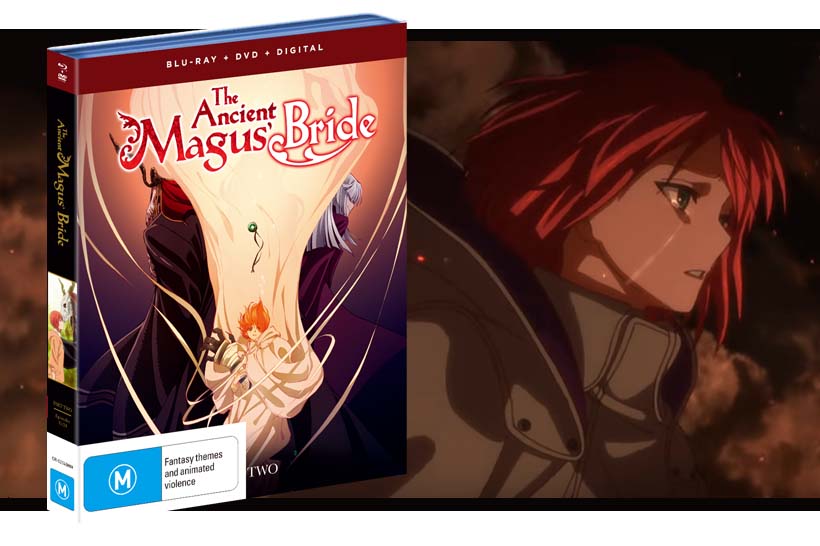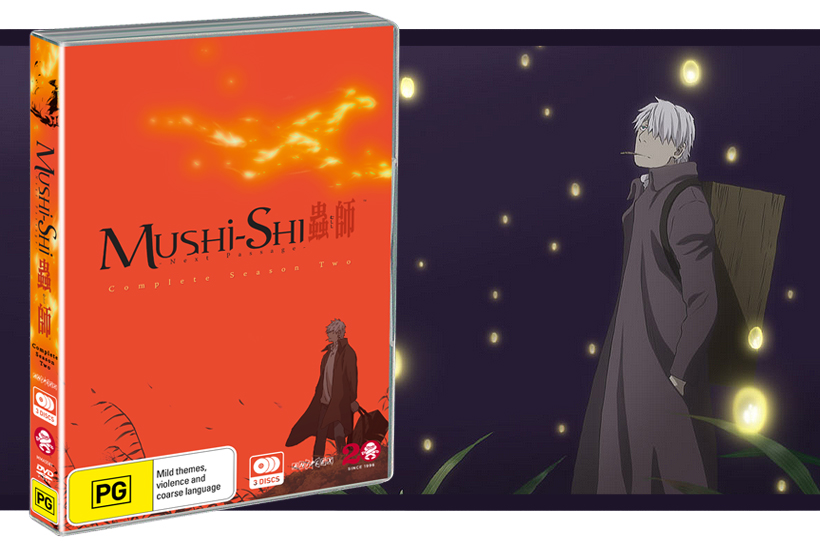In the final stretches of a war between two nations, 14-year-old Violet Evergarden loses both of her arms and the person she cares for most during a siege against the enemy’s headquarters. Transported to hospital for recovery, Violet’s arms are replaced with prosthetics and she is offered a job at CH Postal Services by an acquaintance of the Major she reported to during the war. Having been used as a weapon on the battlefield from a young age, Violet struggles to adapt to civilian life and puzzles over the last words of her Major before they were separated. While working at CH Postal Services, Violet is introduced to the work of an “Auto Memory Doll,” a person that transcribes the thoughts and feelings of others for a living. Violet is fascinated by the work and becomes an Auto Memory Doll to understand the feelings that are so important that a person would commission professionals to put them to paper. In doing so, she hopes to understand the final conversation she had with her Major and come to terms with her new life in a world that no longer needs her to be a weapon of war.
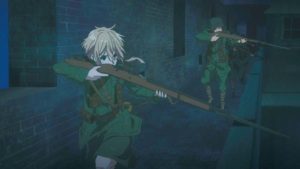
Violet Evergarden is a beautifully animated series with excellent sound design. The animation standards in some scenes are on par with other animated cinematic releases, and the soundtrack is gorgeous with great details like the clicks and whirs of Violet’s prosthetic arms. However, despite these positives the series delivers a confusing tale of post-war trauma, with Violet’s story as a child soldier during war and her present as an Auto Memory Doll trying to assimilate into society running parallel with the stories of the clients she is writing for. The final product is messy as new characters have their arcs introduced and completed in single episodes at such speed that the narrative beats come across as inconsistent and insincere. Most of this stems from the narrative’s lack of focus, but Violet’s generally inconsistent characterisation does not help either, as she is both perceptive and understanding of others and their complex feelings while also completely misunderstanding basic emotions, words and concepts.
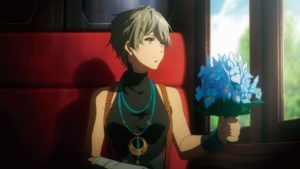
Violet as a character has a lot going on – she is an underage (despite her misleading design), handicapped, war veteran with severe PTSD. Unfortunately, Violet Evergarden touches on these and many other important themes without really exploring any of them. The war Violet participated in is confusing and mysterious but not in any way that questions why the conflict actually existed in the first place. Instead, the war is depicted as extremely one-sided, with one-off characters name-dropping friends or family they lost in the war every now and again and the few soldiers we do see from the other side depicted as moustache twirling villains. One episode that takes place on the battlefield and follows the loss of a young soldier is the only episode that made the tragedy seem real. Aside from the single OVA episode which does some good world-building on the traumatic consequences of war and creating art to cope, the war in Violet Evergarden only rears its head at inconvenient times towards the end of the series without much context of what the war was or what it meant.

PTSD is an ever-present theme in this series, with Violet’s trauma largely defined by her feelings of worthlessness as a discarded human weapon, and one dream sequence that touches on her insecurities and turmoil. The focus of this turmoil relates to her commanding officer during the war, Major Gilbert, and her confusion over his final words to her before they were separated, her belief that she should be discarded if the Major no longer needs her as a weapon, and finding a purpose now that she is no longer by the Major’s side. Violet Evergarden also tries to depict Violet as someone who is coming to terms with the horrors she inflicted during the war, but this comes across as incredibly insincere as all of her trauma is tied to a single person. The unflinching focus on the Major and his impact on Violet does the show a disservice as even when the narrative attempts to confront her with the sheer horror of her actions during the war through memories or other characters berating her for it, it seems insincere because she never shows genuine concern over anyone but the Major.

Violet’s prosthetics always seem to be a source of mild surprise and discomfort for other people as well, but this is never really addressed and seems to be used as a source of pity. It dos lead to some interesting moments though, like when Violet places a gift brooch the Major bought for her in her mouth and bites down on it. Saphras theorised that this was her way of “feeling” it due to her prosthetic limbs, but it also could have been self-stimulatory behaviour or simply something comforting or idiosyncratic to her. Too bad it only happens once, and this interesting characteristic of hers that could give a better insight into her as a character, a child, a potentially neurodivergent person, and someone recovering from trauma is quickly discarded.
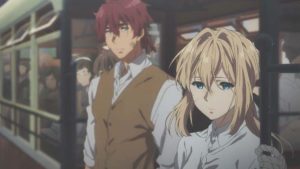
I have not mentioned the supporting cast of Violet Evergarden because there is not much to say; they are either Violet’s acquaintances who get very little meaningful screen time or agency or they are the clients she works for who stand in line for their turn to have a one-episode arc. There was a nice scene towards then middle of the show where Violet reflects on the clients she has worked for and the impact they have had on her, but I was not personally invested in many of their individual stories despite the tragic and bittersweet angle the show forced on each of them.

I thought I would really enjoy Violet Evergarden due to its focus on assimilation into society and recovering from post-war trauma. Unfortunately, this was not the case and the inconsistent characterisation of Violet, the mess of concurrent stories that did not resolve into an overall effective arc for Violet, and the intense focus on Major Gilbert as the singular source of her trauma left me mostly disappointed. Stories dealing with PTSD, disabilities, and themes relating to war and post-war trauma are so important, and if any of these things are topics you want to see in media then you should check out Violet Evergarden for yourself to form an opinion. Although it did not manage to captivate me, I am sure it’s a show many people could fall in love with based on the beautiful animation quality and important themes.
A review copy was provided by Madman Entertainment to the author for the purpose of this review.
©Kana Akatsuki, Kyoto Animation / Violet Evergarden Production Committee




